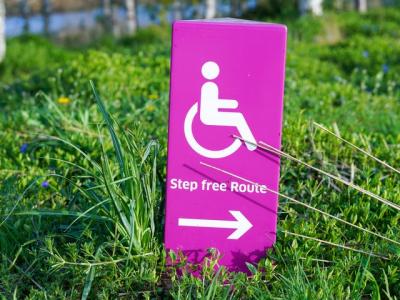“The only way out has steps…” - making events accessible
Posted on 28 June 2021
“The only way out has steps…” - making events accessible
 Photo by Yomex Owo on Unsplash
Photo by Yomex Owo on Unsplash
With in-person events set to return, Dr Robin Wilson shares his experiences of attending conferences with a wheelchair and suggests how to make events more accessible.
As a research software engineer, and former academic, I’ve attended many conferences and workshops over the years - ranging from enormous academic conferences (such as the European Geophysical Union conference in Vienna) to small community workshops. This was all pretty easy and enjoyable, until around six years ago - when things suddenly got a lot more difficult.
Unfortunately, around that time I became disabled: specifically, I got diagnosed with myalgic encephalomyelitis (ME), a fatiguing condition that has massively affected my life. As I started to find walking anything more than very short distances extremely difficult, I started to use a wheelchair. It was then that I found out just how inaccessible some of these events can be.
Issues at venues
I could talk for hours about some of the issues I’ve experienced - but I’ll stick to giving just a few examples:
- One conference was described by the venue as ‘completely accessible’, but I was told I’d need to call a security guard every time I wanted to go to the toilet, as the only accessible toilet was in a secure part of the building and required passing through four locked doors to get to it!
- At another conference, I wheeled my way into an annexe to attend the conference dinner, and when I wanted to leave at the end, I asked where the exit was, only to be told “The only way out is up the stairs”. I explained that I’d got there in my wheelchair so I must be able to get out using my wheelchair - but was told that the main entrance was locked late at night and they couldn’t find the key. In the end the only option I was offered was for them to carry my chair up the stairs!
- A hotel abroad where I’d specifically phoned them to book an accessible room, only to be told when I arrived that the accessible room wasn’t available and I’d have to make do with a normal room.
One of the most frustrating things is that all of these conferences stated on their website that they were “fully accessible” - and often it wasn’t the organiser’s fault at all, they just trusted the venue when they said they were accessible.
Making events accessible
So, what would I suggest to event organisers to try and stop some of these problems occurring?
Sadly, I think the first suggestion has to be not to trust the venue’s statements on accessibility. Go and check it yourself. Ask to be shown the disabled toilet (is it up steps? You wouldn’t believe how many disabled toilets are up steps!), check that all the rooms you want to use are accessible, check that lifts are large enough (some lifts are remarkably tiny, and some powered wheelchairs can be quite large) and accessible enough (weaving around tiny corridors for ten minutes to find the lift entrance right at the back of the building isn’t a great experience), and so on.
Are there accessible ways for people to get to the venue? If all the local public transit doesn’t have step-free access, then that would be a problem. Similarly check for local hotels with adapted or wheelchair-friendly rooms. Check all of this before you sign the contract.
Of course, you may not know exactly what wheelchair users need in terms of accessibility. Some of it is fairly obvious - I mean most people know that a wheelchair can’t go up a flight of stairs - but some is more subtle. So here is my next suggestion: talk to your community. Make it clear in the adverts and on the website that the event is aiming to be as accessible as possible, and that potential attendees should contact you with any questions about accessibility. If you know there are some disabled people in your community then reach out to them specifically and ask what you could do to help - you’ll often find that disabled people are assuming by default that they can’t attend the event, and by contacting and offering support they will feel empowered to attend.
The third thing to remember is to take into account other disabilities too: wheelchair users are not the only people you need to think about. What about hearing-impaired or sight-impaired attendees? Does the venue have a hearing aid loop? Can you put reserved seats at the front of the room? Can you have live transcription or signing? What about people who may need a quiet room to get away from the busyness of the conference? As you can see from just those few examples, there are many more things to consider. A resource that I find very useful is Alex Chan’s list of ideas for inclusive events which includes a lot of the stuff I’ve mentioned already in the context of disability, plus a whole lot more to try and make the event inclusive to minorities and other people who may not always feel welcome.
Finally, remember that things don’t always go to plan - and disabled people know this too. If something doesn’t work out, just talk to the attendees who are affected by it, apologise, come up with a reasonable temporary solution and remember it for next time. Good luck!

